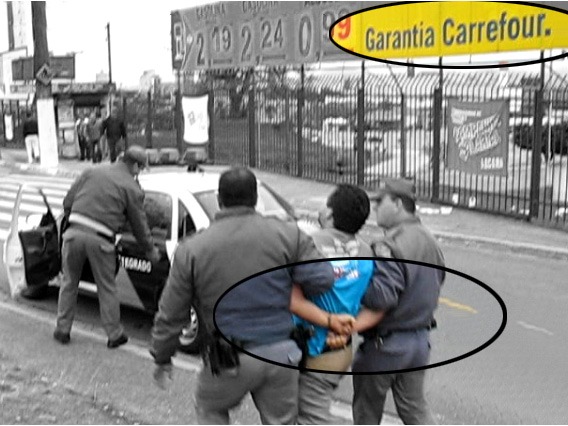Last August 30, the National Confederation
of Store and Services Workers (CONTRACS), an
IUF affiliate, called all Carrefour unions
to a demonstration held in front of the
French transnational corporation’s
facilities in the Sao Paulo district of
Osasco, demanding that workers be given a
just participation in the company’s profits
and operating income. Demonstrators were
savagely attacked by the Police, and some
union leaders were taken into custody.
Sirel spoke with Lucilene Binsfeld,
president of CONTRACS, who gave an account
of what happened and announced the actions
the labor movement plans to take against
Carrefour’s deplorable conduct.
-Can you tell us what the relationship
between CONTRACS and Carrefour had been like
until this happened?
-There’s a project prepared by the United
Workers’ Federation (CUT), called
CUTMULTI, which deals specifically with
transnational corporations. CONTRACS
decided to work with Carrefour and
Wal-Mart, among others.
One of the demands of union leaders in this
process was to discuss a proposal for Worker
Participation in Profits and Operating
Income (PLR). We began negotiating
with the company and asked Carrefour’s
management to provide us with some
information to verify whether it was
possible to meet the targets presented -in
the proposal- to the workers.
Up until that moment, the relationship with
the Union had been a good one. As soon as we
requested the information, the situation
grew tense, as the company refused to
disclose any income information. We were
puzzled by this reaction, because if we
didn’t have access to the information, how
could we verify whether it was possible to
meet the targets for a PLR?
At that point, the company contacted
CONTRACS via e-mail to pressure us to
accept their proposal without questioning
its content, or else they would walk out of
the negotiations. We discussed this with the
Carrefour network union, and decided
to hold a peaceful rally, in Osasco.
-How was the demonstration carried out?
-We gathered at three gates in front of the
Carrefour facilities, organizing
meetings, waving our flags, and asking
management to resume negotiations with the
labor movement. After a while we decided to
concentrate at a single gate, when it was
time for customers to begin arriving. What
we wanted was to talk to them, to explain
what the working conditions of Carrefour’s
employees are like. When management saw this
it called the Military Police, which came
charging brutally against the demonstrators.
In a clear abuse of authority, they
assaulted workers with pepper spray,
threatened them with billy clubs, and
finally hit several of our fellow workers.
Despite our attempts to reason with them, we
only received more unjustified violence,
specially considering that we had announced
that the demonstration would last until 10
am. There were only four minutes to go
before we left when they came down on our
fellow worker Alci Matos, the
Secretary of International Relations of
CONTRACS: they seized him violently to
arrest him, hitting and cuffing him, while
all the other policemen made a human barrier
to prevent demonstrators from coming near.
We asked them to let him go, explaining that
we were leaving, but they paid no attention
to us.
-What’s Alci’s situation now?
-He was taken to jail, charged with
resisting arrest and with contempt of
authority, which is absolutely false as they
gave him no warning, they just seized him
and started to hit him. The Confederation
notified his lawyer and he was freed that
same day, after a forensic examination, but
he’s still in a state of shock as a result
of the violence he suffered.
-What actions has CONTRACS taken?
-In Alci’s case, we’re filing
a criminal report, and together with the
national chapter of CUT, we’re
requesting a hearing with the Public
Security Secretary of the State of Sao
Paulo, to present videos and photos of the
demonstration proving it was a peaceful
rally and that there was no need for the
Military Police to act with such violence.
The worst thing about the situation, besides
the way the Police acted, was the attitude
of the transnational corporation
Carrefour, in refusing to negotiate,
thinking that it could solve anything that
way.
In addition, we’re calling on all our
affiliates and on the international
organizations we are members of, IUF
and UNI, to join the campaign,
sending messages to the company to condemn
its behavior and ask it to resume
negotiations.
Also with CUT’s national
chapter, we’re sending a video of the
demonstration to France’s CFDT
with the aim of initiating talks with
Carrefour’s parent company in that
country, so that it will intervene in the
labor policy of its Brazilian
subsidiary.
-What deadlines have you set for Carrefour’s
response?
-We’re giving them until mid September,
maximum, because we believe that once
management begins to receive letters from
around the country and the world, it will
have to consider our proposal of resuming
negotiations, and it will have to give us an
answer. If not, then we’ll have to evaluate
a new action strategy to face this
situation.
